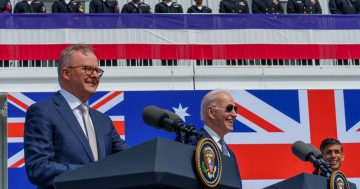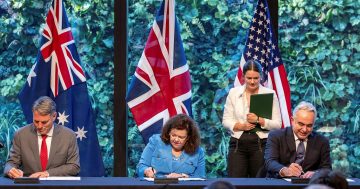
A US nuclear-powered submarine transits through the Arabian Gulf. Photo: US Navy.
Although much of it had already been released, the ACT’s 2021 budget had a distinct spin: growth and infrastructure priorities were identified as key aims in a budget that seeks to repair the pandemic damage.
But how will the government pay for their growth measures? With your rates, according to many.
In our most recent poll, we asked Is the 2021 Budget on track to meet our needs in a tough economic climate? A total of 779 people voted.
Your choices were to vote Yes, the ACT needs to go for growth to get out of the pandemic spiral, received 35 per cent of the total, or 272 votes; alternatively, you could choose to vote No, life’s hard enough without even higher rates. This was a clear winner with 65 per cent of the total, or 507 votes.
This week, we’re wondering how you feel about our potentially nuclear future. The question is close to home following the Federal Government’s switch to US-designed nuclear submarines.
The ANU is the only facility in Australia that enables hands-on nuclear training. Professor Andrew Stuchbery said the new security deal provides an exciting opportunity for nuclear science in Australia, which only consisted of a handful of jobs.
“This deal changes everything when it comes to nuclear science in Australia,” he said. “It ushers in a new era for the nation.
“In the past, Australia’s nuclear technology workforce needs have been minimal and a lot of talented and trained people from across nuclear science have headed overseas.”
But is domestic opposition to a nuclear industry likely to short circuit a nuclear-powered future for defence and energy?
Professor Kenneth Baldwin – who heads up a research project called ‘ANU Grand Challenge: Zero-Carbon Energy for the Asia-Pacific’ – says Australia is one of only a few countries in the world that has forbidden the use of nuclear power by legislation.
“Other countries make a decision based on economics and environmental issues and other parameters, but we’ve short-circuited that conversation,” said Professor Baldwin. “Only if this federal law is rescinded can a true domestic nuclear industry move forward.”
This prompted some furious arguments in the comments.
JS9 said: “Like high-speed rail, the time to get into nuclear was about 30 years ago. By the time any meaningful nuclear industry is developed here, it is likely it will be uncompetitive financially and that the solutions to the challenges being faced will be overcome.
“Had it been done in the 80s or 90s, we could be in a position such as France where they can use it as their basis for moving to a grid where emissions are minimised. But we didn’t, and by the time (even using new age reactors) we get to a point that there would be any significant contribution from nuclear to the grid, its likely to be exactly the same stranded assets that are facing coal power plants at this point, and will face gas power plants in time”.
But Nobody thought, “The sooner the governments remove the ban on nuclear power, the sooner this country can get to net zero emissions”.
What do you think about an expanded nuclear future?
Here’s this week’ poll question:





















